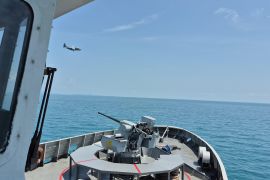It also endorsed four new districts, namely Pangandaran (West Java Province), Pesisir Barat district (Lampung Province), South Manokwari (West Papua Province) and Pegunungan Arfak district (West Papua Province).Jakarta (ANTARA News) - The House of Representatives (DPR) endorsed North Kalimantan Province as a new autonomous region on Thursday, after bifurcating it from the East Kalimantan Province.
In a plenary session led by the House of Representatives` Speaker Marzuki Alie, the Chairman of the House of Representatives Commission II Agun Gunanjar said that it also endorsed four new districts, namely Pangandaran (West Java Province), Pesisir Barat district (Lampung Province), South Manokwari (West Papua Province) and Pegunungan Arfak district (West Papua Province).
According to Gunanjar, with the approval of 5 bills on the establishment of new autonomous regions, the Parliament hopes that regional division could be a solution to optimize public service and shorten the range of government control to be more effective and efficient.
He expressed hope that there will be no further annexation of Indonesian regions by Malaysia, as North Kalimantan borders the Asian neighbour. In 2002, Malaysia had annexed Pulau Sipadan and Ligitan.
"Based on the principle of effectiveness, we need concrete action from the government in extending its influence over vulnerable border regions of Indonesia to keep them safe from annexation efforts," he said.
In the context of North Kalimantan province, some regions are disputed and are vulnerable to boundary stakes displacement or annexation efforts. Sebatik, Krayan (Nunukan District) and parts of the Ambalat Sea have all been involved in annexation efforts.
"In addition, there are also many illegal Indonesian workers in Sabah and Sarawak who are vulnerable to inhumane treatment such as human trafficking," he said.
He also added that in the geostrategic sense, North Kalimantan Province is an open door to Malaysia (Sabah), South Philippines and Brunei Darussalam. The province is considered to be in a strategic geographical location so it can be developed into a national force to counter any threats to the Republic of Indonesia, from within or without.
However, he mentioned that the people living close to the border are slowly losing their faith in Indonesia.
"This is due to economic factors, where border regions are largely rural in character and are untouched by development because of the central government being hindered by the wide range of control in Samarinda, East Kalimantan Province," he said.(*)
Editor: Heru Purwanto
Copyright © ANTARA 2012











